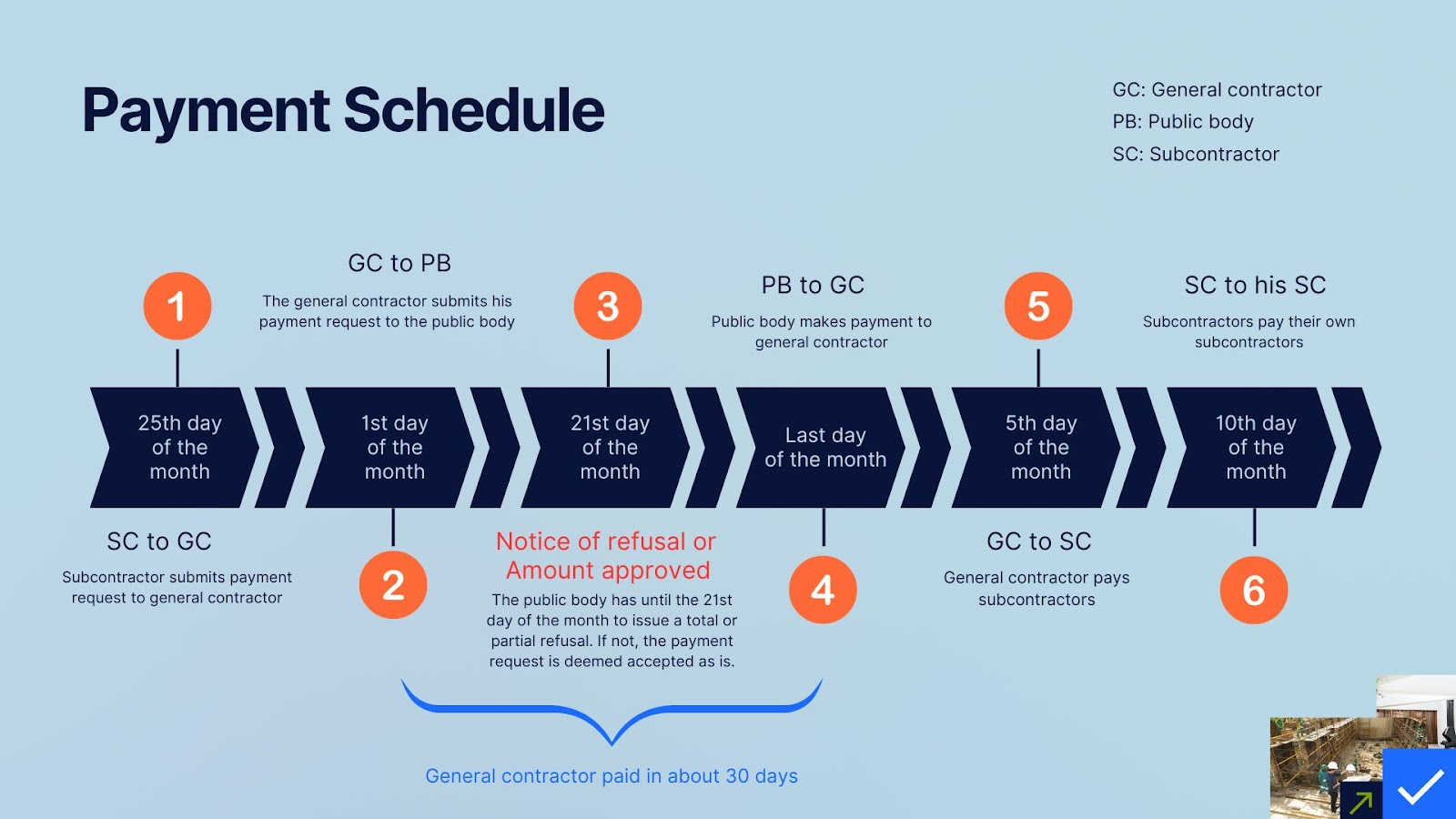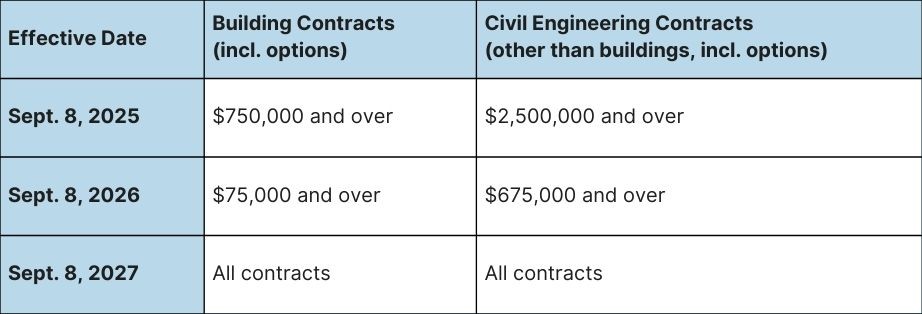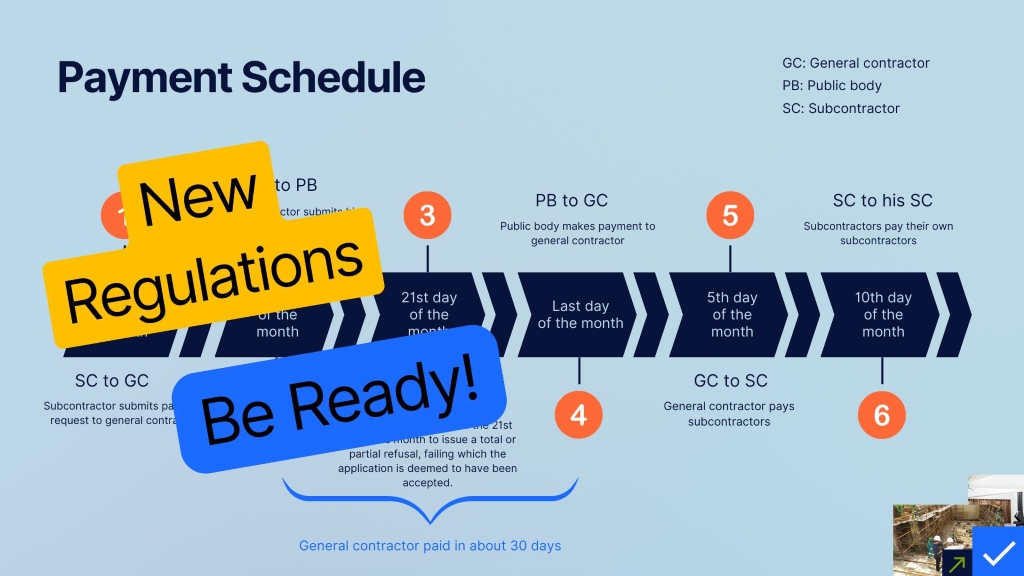What is this about?
On April 23, 2025, the Gazette officielle du Québec published a draft regulation concerning prompt payment and rapid dispute resolution for construction contracts. This draft regulation, which stems from the Act respecting contracting by public bodies (chapter C-65.1), aims to support the financial health and competitiveness of businesses throughout the subcontracting chain. These new provisions impose significant obligations on public bodies, general contractors, and their subcontractors regarding payment timelines and dispute management.
Quebec's new regulation aims to modernize payment practices in the construction industry. Its main objectives are to:
- Accelerate Payments: Reduce payment timelines to ensure greater payment predictability for contractors and their subcontractors.
- Strengthen Transparency: Establish clear rules for payment refusals, deductions, and holdbacks.
- Encourage Collaboration: Promote better communication and the amicable resolution of disputes.
- Implement Rapid Dispute Resolution: Provide an effective, streamlined, and less costly alternative to traditional legal action.
Who is Affected?
If you are a public body in Quebec that awards construction contracts, this new regulation almost certainly affects you. The regulation applies to any public body subject to the Act respecting contracting by public bodies (LCOP - chapter C-65.1) for its construction contracts, as well as any public subcontracts related to them.
Specifically, Section 4 of the LCOP provides a complete list of the public bodies affected. This includes, among others:
- Government ministries;
- School service centres, school boards, and universities;
- The various health institutions listed in Appendix II of the Act respecting the governance and management of the health and social services system;
- Budgetary and non-budgetary bodies subject to the Financial Administration Act (see Appendices 1 and 2 - exceptions apply).
As certain conditions or exceptions may apply, we recommend you confirm with your legal department whether your organization or a specific contract is subject to this new regulation.
What's Actually Changing?
Here are the key changes that public bodies, contractors, and their subcontractors must consider.
A New, Much Stricter Payment Timeline
The first part of the regulation imposes strict deadlines that must be respected, from the moment a payment request is submitted until the funds are paid. Each party in the payment chain must meet specific deadlines every month to ensure payment predictability for the entire supply chain.
Strict Deadlines for Issuing a Refusal
Another critical change: the public body now has a maximum of 21 days to issue a formal refusal notice (and its justification) to the general contractor if it disputes the content of a payment request. Should it fail to issue a refusal notice within this prescribed period, the "presumption of validity" (explained in Section 7) means the payment request is deemed approved (unless the initial payment request was submitted late). The amount must then be paid by the last day of the current month. Contractors have similar obligations toward their subcontractors.

Clear Rules for Deductions or Holdbacks
Deductions or holdbacks applied to payment requests, as well as the terms for their release, are also more clearly defined. Holdbacks are now permitted only in these five situations:
- Contract execution holdback (maximum 10%)
- Holdback to ensure the correction of defects and deficiencies
- Holdback for the repair of damages
- Holdback to ensure subcontractor declarations and discharges (or those related to legal hypothecs) are settled
- Final payment holdback pending the submission of specific documents required by the contract or this new regulation
A New, Comprehensive Rapid Dispute Resolution Process
Finally, the regulation establishes a new, comprehensive regime for the rapid resolution of disputes. This includes the conditions for recourse to an adjudicator, deadlines for submitting notices, and the procedures for the appointment and intervention of adjudicators. This process has its own strict timeline for filing a dispute, appointing an adjudicator, receiving a decision, and settling any amounts owed.

How Long Do I Have to Comply?
The new regulation has been in effect, under certain conditions, since September 8, 2025. However, it includes a phased implementation schedule based on contract value (Section 93):

Given the scale of these changes and the size of some public organizations, it is imperative to begin adjusting internal administrative processes immediately. Failure to comply with these obligations could result in financial penalties (interest on amounts due), costly litigation, and even potential damage to the public body's reputation. This raises an urgent question for public bodies and the rest of the supply chain: do they have the necessary tools to meet their new obligations?
Are Our Current Tools Adequate?
Faced with this new reality, public bodies will almost certainly need to overhaul their administrative processes to track and comply with the new payment deadlines. Robust contract management tools are essential. We have observed that many organizations, both public and private, rely on Microsoft Excel for detailed contract progress tracking, alongside a financial system or ERP for processing invoices and payments.
The question is: are these tools sufficient to meet these new requirements? While every organization is different, the short answer is likely no. Our experience shows that using traditional tools like Excel and a generic ERP can be problematic, especially given the tight deadlines and risk of financial penalties introduced by this regulation. Here are the most significant challenges:
- Lack of Collaboration: Excel and most ERPs are not designed for the real-time, multi-party collaboration required to manage the approval of payment requests between professionals and project managers within a strict timeframe.
- Static Data and Manual Processes: These tools often require manual data entry and file transfers, increasing the risk of errors and delays in tracking payment requests.
- Siloed Data: Contract progress information, payment requests, and related communications can be scattered across different systems and inboxes, making traceability, deadline tracking, and auditing extremely complex in the event of a dispute.
Think about your current process: for each payment request pending approval, can you instantly tell who you are waiting for and for how long? With this new regulation in effect, it is essential for managers in public bodies to be able to answer "yes" to this question. Fortunately, tools exist to provide this support.
What Is the Alternative?
While many generic project management solutions are available, they are often not tailored to the specific needs of project owners or the complexities of construction contracts. For 13 years, Aidi has offered Quebec-based project owners a specialized construction project management solution. With its robust budget and contract tracking module, Aidi is particularly well-suited to help public bodies meet their new obligations.
Aidi facilitates online collaboration with an unlimited number of users, centralizing all information and approval workflows. This allows contractors to submit payment requests (PRs) and change orders (COs) directly on the platform, ensuring seamless communication and a full audit trail of every change. The platform can also quickly generate mandatory documents (such as refusal notices), eliminating scattered email chains and minimizing delays.
Aidi's robust contract management module is designed from the project owner's perspective. It manages complex payment schedules, precisely tracks holdbacks, and systematically logs notices and discharges. This reduces the risk of formula errors and miscommunications often encountered with Excel spreadsheets.
Finally, by centralizing all data, Aidi allows for the rapid generation of detailed reports on contract status, approval timelines, and potential bottlenecks. This gives managers a clear, real-time overview without manual data compilation.
The Bottom Line? By using Aidi, your organization will be prepared to meet tight deadlines, manage disputes more effectively, reduce the risk of incurring interest charges, and maintain better relationships with all stakeholders.
Need help? Contact Us!
Ready to prepare your organization for this new reality? Contact us! We can show you exactly how the Aidi solution will help you meet your new obligations. For 13 years, Aidi has supported public and private project owners in managing their construction projects more effectively. With this new regulation, our team is perfectly positioned to guide you through this digital transition.
Official Government of Quebec Resources
For more information, you can consult the following government resources:
- Presentation of the new regulation (FR): https://www.tresor.gouv.qc.ca/faire-affaire-avec-letat/reglements-paiements-rapides-differends
- Full text of the new regulation (FR): https://www.publicationsduquebec.gouv.qc.ca/fileadmin/gazette/pdf_encrypte/lois_reglements/2025F/86131.pdf
- Four-part video series on the new regulation (FR): https://www.youtube.com/playlist?list=PL06SHrU86surN1FGxpoVbUfU-8JdVJuGg






